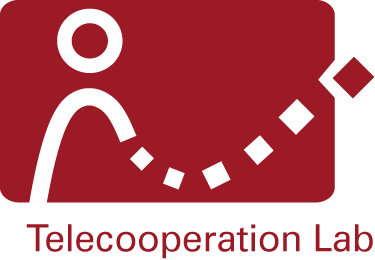Motivation
Trust is a well-known concept of everyday life, which simplifies many complex processes. Some processes are just enabled by trust since they would not be operable otherwise. Trust in our social environment allows us, on the one hand, to delegate tasks and decisions to an appropriate person. On the other hand, trust facilitates efficient rating of information based on the experience with the communication partner and, if applicable, on his reputation. Essential aspects of social trust, besides personal experience and reputation, are the expected risk and benefit associated with the action of concern.
Vision
In Weisers vision of ubiquitous computing, computers, as they are common today, are more and more vanishing. Instead we will be surrounded by a multitude of “computation enabled” smart objects, which are perpetually in contact without the necessity of user interaction. The goal of our approach is to support the users with a virtual representative, a minimal (virtual) entity (ME), which disburdens the user from the communication of all kinds of available computers, services, data bases, etc. as far as possible. In order to choose an appropriate service from a bunch of redundant services, the ME needs to collect information about the available services and to evaluate this information. The transfer of the concept of trust to computer science seems to be a promising approach for this task. The vision of “trust-aided computing” is about applications which explicitly model trust to provide a basis for delegation decisions.
Roadmap
As a first step to make this vision come true, we will define the concept of trust, in a way which includes its main foundations. Afterwards, we will design a new computational model of trust, which provides a decent long-term performance and is as robust as possible to different kinds of attacks. Furthermore, it is necessary to enable the user to integrate his preferences in the trust model, and to provide a meaningful representation of the trust computation results. An additional requirement will be to integrate the risk and benefit, expected by the user or the ME, in this model. In the end, a framework should be developed which allows the explicit integration of trust in different kinds of software applications, as a first step towards “trust-aided computing”.
Funding
DFG – Graduierten Kolleg
The PhD program in Enabling Technologies for Electronic Commerce is located at the Darmstadt University of Technology. It is a program funded by the DFG, in which young researchers carry out their PhD thesis research in specific areas related to electronic commerce. Furthermore they gain a global view of related issues through a companion series of lectures and seminars.
Electronic commerce, particularly over the Internet, is rapidly developing and gaining acceptance. However, many fundamental questions have not yet been answered adequately and the underlying technology is still evolving. This includes not only information technology issues (e.g. interoperability, data encryption systems, quality of service guaranties), but also organizational and legal frameworks. The “electronification” and as a result of this the globalization and a more open market are of enormous economical, technical, and social consequence.
People
Scientific Advisor
- Prof. Dr. Max Mühlhäuser
Former Project Member
- Sebastian Ries



